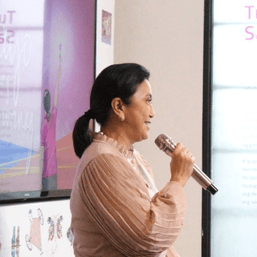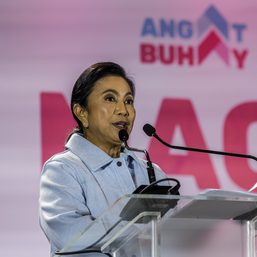SUMMARY
This is AI generated summarization, which may have errors. For context, always refer to the full article.
![[Newspoint] A lesson begging to be learned](https://www.rappler.com/tachyon/2023/02/Constituency.jpg)
I recently published here a proposal for those who voted for Leni Robredo to get over their loss and organize themselves into a constituency that would look after its own well-being. And how? By sharing resources and at the same time taking up watchdog duty seriously, demanding actively, boldly, and constantly that state officials deliver, as only expected of them, what every Filipino deserves as a matter of democratic right.
The idea presented itself as I observed the continuous dissipation of state resources under covetous regimes – first Gloria Arroyo’s, then Rodrigo Duterte’s, and now Ferdinand Marcos Jr.’s – and the selective blindness afflicting our oversight institutions. The following passage, reproduced from that piece (“19 million reasons,” Rappler, December 22, 2022), essentially describes how I envision the scheme to work:
“Organized as an economic community, [this voting bloc] should be able to refine its self-help workings and eventually improve the lot of its constituent poor. And organized further as a counterforce, it should be able to bring to bear pressure on the ruling power with weapons that, for all their proven effectiveness in the fight against the Marcos dictatorship, have been left lying idle since – a market boycott against crony firms (this time against exploitative states, too, like China), a deliberate dispensing of charity and other social aid, civil disobedience, and, yes, people power and other mass-protest actions.”
The idea having met with rather extreme reactions, I do realize it needs further arguing, not to mention fleshing out and refining. But before I proceed, a correction:
I seem to have seen a report saying Robredo in the end got 19 million votes. Upon reviewing my numbers, I find that the last officially posted count, after 98.35% of the votes had been tallied, is 14.8 million – presumably the counting was stopped once the Commission on Elections had determined there was no way the results would change with any further counting. Whether a proper count happened at all is in legal dispute. At any rate, I’m making the change as a concession to the official verdict as it stands for the moment. But again, if I may, I am rounding off the number to 15 million for easy reference.
Now, to continue…
I will not bother with reactions of approbation; they don’t help the debate. It’s the skeptical reactions that do. For one thing, they give me an opportunity to give the proposal a more rounded perspective.
For drawing the line between the 15 million who voted for Robredo and the 31.6 million who voted for Ferdinand Jr., not to mention those who did not vote for either, I’ve been criticized as divisive, if not separatist or, worse, secessionist. Let me first take up the issue of secessionism, being the most serious of the allegations, indeed the criminal one, and also that of separatism, since it itself suggests a potentially criminal flaw of character – a sense of prejudice, particularly in matters of ethnicity, religion, and gender. Anyway, both issues should be easy enough to dispatch: they make for a ridiculous comparison with what I propose.
Secessionism refers to an armed break by a self-declared nation with the larger nation of which it has been a constituent part. The Moro liberation movements, as originally intended, are an illustration. I don’t see how anything so treasonous could be imputed to a proposal so patently benign as mine. As for the allegation of separatism, that should be disproved outright by the free mix of characters, cultures, persuasions, and income classes that the constituency I propose admits.
As for divisiveness, it seems confused with division, which is a natural consequence of every free vote. In fact, the free vote and the open division that inevitably results from it are precisely what makes democracy work. In other words, division is unintended; it just happens and for a good reason. Divisiveness, on the other hand, is insidiously discriminatory; it proceeds from Machiavellian motives.
Perhaps, the worst than can be said of my proposal is that it is not inclusive, but that’s only for now and for purely practical reasons. All 108 million of us are just too numerous to organize at once and under a common strategy. Not only that. We’re too diverse in customs, in character, in beliefs, even in language. And, to raise the rawest root of resentment for the underclasses, we are divisible between haves and have-nots.
But, despite all this, those 15 million seem to have proved themselves alike in heart and mind by setting themselves apart from the maddened crowds that make up the rest of the nation and coming together for a far-reaching cause. They have demonstrated that by their vote and, even before that, during the electoral season, by the ardor of commitment that sent them pouring out in the streets as one in numbers that recall EDSA.
EDSA, of course, was the quick burn, the lost opportunity, the vanished constituency, the precise lesson begging to be learned today. – Rappler.com
Add a comment
How does this make you feel?


![[Newspoint] A fighting presence](https://www.rappler.com/tachyon/2024/07/thought-leaders-a-fighting-presence.jpg?resize=257%2C257&crop=441px%2C0px%2C1080px%2C1080px)
![[Closer Look] ‘Join Marcos, avert Duterte’ and the danger of expediency](https://www.rappler.com/tachyon/2024/06/TL-trillanes-duterte-expediency-june-29-2024.jpg?resize=257%2C257&crop_strategy=attention)




![[Newspoint] 19 million reasons](https://www.rappler.com/tachyon/2022/12/Newspoint-19-million-reasons-December-31-2022.jpg?resize=257%2C257&crop=181px%2C0px%2C900px%2C900px)
There are no comments yet. Add your comment to start the conversation.